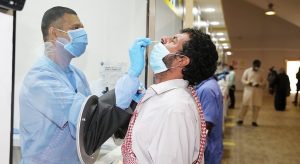Actress Reena Rai Is All Set For New Movie Project In 2021 After Her Debutant Movie Rang Punjab
UAE made great efforts to protect workers during coronavirus pandemic
Published on May 21, 2020
By Vanessa Tomassini.
United Arab Emirates performed great efforts to guarantee that employees received adequate protection during the COVID-19 pandemic, providing them with the needed medical care and all other necessities. UAE officials spent particular attention defending migrant workers in the private sector. Ministry of Human Resources and Emiratisation ensured that employees of private sector establishments, infected with COVID-19, were considered as sick cases entitled to ill leave, calling on companies and employers to not terminate the co-operation with any  employee for this reason.
employee for this reason.
According to the UAE Federal Law No. 8 of 1980, an employee who has completed more than three months of service, after the completion of a probation period, is entitled to sick leave for a period not exceeding 90 days for every year of service, wherein he should be paid a full salary for the first 15 days and half salary for the subsequent 30 days. The country showed great keenness on getting the worker to obtain a wage even in case the worker got infected with the virus and receiving treatment.
UAE provided comprehensive and free healthcare services to citizens and residents alike during the COVID-19 pandemic. Local authorities called upon the private sector to document employee leaves, note any amendments to business contracts, and ensure the payment of salaries through the Wages Protection System (WPS). The MoHRE granted early leave as part of COVID-19 countermeasures to document leaves as a temporary amendment to business contracts available through its website and smartphone’s app. The option of taking an early leave allowed migrant workers to return to their country temporarily until the end of the crisis.
The National Emergency Crisis and Disasters Management Authority (NCEMA) developed a national plan for responding to the pandemic, focusing on the consolidation and maintenance of laws, policies, and procedures of emergency and crisis management at the national level. On March 14th, the NCEMA launched the Business  Continuity Readiness Guidelines for UAE Organisations aiming to sustain business continuity for organizations across preventive measures, preparing and increasing readiness, and handling of cases, while planning for business continuity. During outbreaks features leadership, remote work strategy, staff distribution, flexibility of procedures, monitoring and evaluation of suppliers, and supply chain readiness.
Continuity Readiness Guidelines for UAE Organisations aiming to sustain business continuity for organizations across preventive measures, preparing and increasing readiness, and handling of cases, while planning for business continuity. During outbreaks features leadership, remote work strategy, staff distribution, flexibility of procedures, monitoring and evaluation of suppliers, and supply chain readiness.
The guidelines clearly explained ways to address the risks arising from the outbreak of epidemics in the organizations that may directly affect business continuity and community stability. UAE organizations at federal, local, and private levels adopted this approach by assessing risks, threats, weaknesses, and consequences thereof.
Scenarios, assumptions, and considerations were developed in an integrated manner to guide the process of planning at all levels as related to points of improvement, and the potential impacts of risks and threats. NCEMA also launched a new website, Weqaya, providing information to workers and local communities, on preventative health and safety measures to curb the spread of COVID-19. Through this platform, users have the opportunity to communicate with medical and health experts by sending their questions.
At the same time, to support the workflow and its efficiency in the government, taking advantage of the sophisticated technological infrastructure available, the UAE Federal Authority for Government Human Resources (FAHR) has issued five guidelines for employees working remotely. Employees covered under the system include pregnant women, mothers of children under grade nine whose duties do not require their presence in the workplace, people of determination, and those with chronic diseases, immune system dysfunction, and respiratory symptoms, as well as employees who are 60-years-old and above. Employees operating via the remote work system in the UAE demonstrated strong work ethics, maintaining the confidentiality of information and documents, and using their work hours to accomplish the tasks required.
The UAE Securities and Commodities Authority (SCA) has introduced several measures to reassure investors and support the stability of the local financial markets, as well as providing listed public joint-stock companies (PJSCs) with further flexibility and relief from certain reporting and meeting requirements in light of current quarantine and social distancing rules.
The Integrated Transport Centre, ITC, implemented a large number of precautionary actions since the outbreak of COVID-19 in the country, including the extensive cleaning and sterilization of the public transport modes and its facilities to protect the society and public transport users.
To guarantee social distance in public transportations, authorities in the UAE added hundreds of buses and trips to their public networks on routes with high demand during peak hours. ITC, for example, introduced five services during morning and four services during evening peak hours in Abu Dhabi City, adding 36 buses and 122 trips to its public bus network on routes with high demand.
Operating additional buses and improving the number of trips, reduced the crowding and helped passengers in maintaining social distances. The supplementary services also diminished their frequency and decreased waiting times.
The UAE leadership proved readiness and expertise in managing the crisis. UAE authorities put workers protection and everyone’s health at the top of their priorities, while ensuring the country’s production continuity and minimizing the related-pandemic financial risks. That’s why the UAE is overpassing the global emergency stronger than before.






















